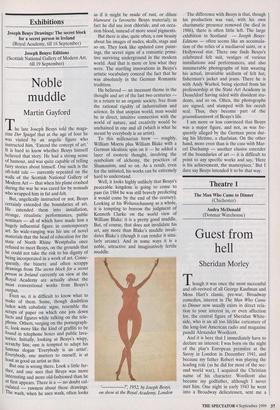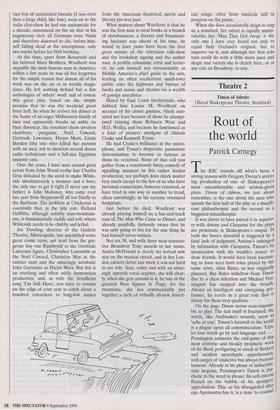Theatre 1
The Man Who Came to Dinner (Chichester) Audra McDonald (Donmar Warehouse)
Guest from hell
Sheridan Morley
Though it was once the most successful and oft-revived of all George Kaufman and Moss Hart's classic, pre-war, Broadway comedies, interest in The Man Who Came to Dinner now usually exists in direct rela- tion to your interest in, or even affection for, the central figure of Sheridan White- side, who is an all too lifelike caricature of the long-lost American radio and magazine pundit Alexander Woollcott.
And it is here that I immediately have to declare an interest; I was born on the night of the play's European premiere at the Savoy in London in December 1941, and because my father Robert was playing the leading role (as he did for most of the sec- ond world war), I acquired the Christian name of his character. Woollcott also became my godfather, although I never met him. One night in early 1943 he went into a Broadway delicatessen, sent me a vast box of unrationed biscuits (I was even then a large child, like him), went on to the radio chat-show he had run nationwide for a decade, announced on the air that in his pugnacious view all Germans were Nazis and therefore deserved to die, before him- self falling dead at the microphone, only two weeks before his 56th birthday.
At the time, apart from Roosevelt and his beloved Marx Brothers, Woollcott was arguably the most famous man in America; within a few years he was all but forgotten for the simple reason that almost all of his work was on the air or in weekly maga- zines. He left nothing behind but a few anthologies of others' work and of course this great play, based on the simple premise that he was the weekend guest from hell. So when he arrives for dinner at the home of an eager Midwestern family of fans and apparently breaks an ankle on their doorstep, the resultant chaos involves choirboys, penguins, Noel Coward, Gertrude Lawrence, Harpo Marx, Lizzie Borden (the one who killed her parents with an axe), not to mention several dozen radio technicians and a full-size Egyptian mummy case.
Over the years, I have seen several great actors from John Wood to-the late Charles Gray defeated by the need to make White- side simultaneously a monster and a hero; the only one to get it right (I never saw my father) is John Mahoney, who came over last year from Steppenwolf all too briefly to the Barbican. The problem at Chichester is essentially that, in the title role, Richard Griffiths, although suitably man-mountain- ous, is fundamentally cuddly and soft, where Whiteside needs to be chubby and lethal.
Joe Dowling, director of the Guthrie Theatre, Minneapolis, has assembled some great comic turns, not least from the gor- geous Issy van Randwyck as the Gertrude Lawrence figure, Christopher Luscombe as the Noel Coward, Charmian May as the sinister aunt and the amazingly acrobatic John Guerrasio as Harpo Marx. But this is an overlong and often oddly humourless production, and, as with the Sondheim song 'I'm Still Here', you have to remain on the edge of your seat to catch about a hundred references to long-lost names from the American theatrical, movie and literary pre-war past.
What matters about Woollcott is that he was the first man to treat books as a branch of showbusiness; a literary and broadcast- ing huckster way ahead of his time, he would in later years have been the first great master of the television talk-show and the bookshop signing and the author tour. A prolific columnist, critic and lectur- er, he saw himself not unreasonably as Middle America's chief guide to the arts, leading an often recalcitrant small-town public onto the highways and byways of books and music and theatre via a wealth of gossipy anecdotes.
Hated by East Coast intellectuals, who dubbed him Louisa M. Woollcott on account of his closet gayness, Aleck mat- tered not least because of those he champi- oned (among them Rebecca West and H.G. Wells), and because he functioned as a kind of pioneer amalgam of Alistair Cooke and Kenneth Tynan.
He had Cooke's brilliance at the micro- phone, and Tynan's desperate, passionate determination to become as famous as those he reviewed. None of that will you gather from a wondrously funny comedy of appalling manners in this rather leaden production; nor perhaps does Aleck matter very much except to the few of us who have personal connections, however removed, or have tried in one way or another to tread, often unwittingly, in his curious, oversized footprints.
Just before he died, Woollcott was already playing himself on a bus-and-truck tour of The Man Who Came to Dinner, and already painfully, furiously aware that he was only going to live for the one thing he had himself never written.
Not yet 30, and with three near-consecu- tive Broadway Tony awards to her name, Audra McDonald is clearly the hottest new star on the musical circuit, and in her Lon- don cabaret debut last week it was not hard to see why. Sexy, sultry and with an amaz- ingly operatic vocal register, she will clear- ly, when she gets around to it, be one of the greatest Bess figures in Porgy; for the meantime, she has commendably put together a cycle of virtually all-new Ameri- can songs, often from musicals still in progress on the piano.
When she does occasionally deign to sing us a standard, her talent is equally unmis- takable; her 'Man That Got Away' is the only one I have ever heard not only to equal Judy Garland's original, but to improve on it, and although her first solo turn could do with a little more pace and shape and variety she is clearly here, or at any rate on Broadway, to stay.



























































 Previous page
Previous page